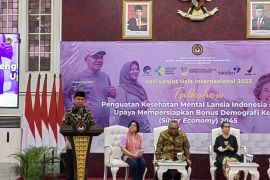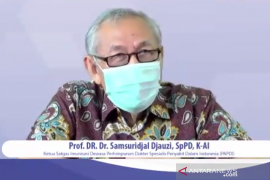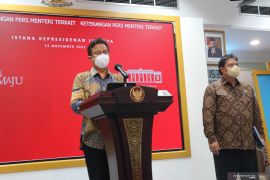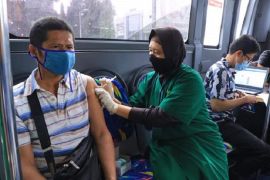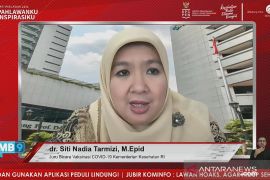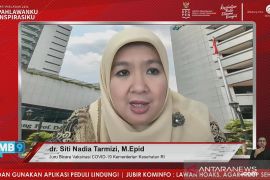This improvement in appetite helps in the fulfillment of good nutrition requirement that leads to better physical condition and quality of life of the elderly.
This is measured from the results of blood analysis and anthropometric test in the "Elderly Meal Project" research, led by a nutritionist from the University of Gadjah Mada, Toto Sudargo.
This research aims to understand whether the provision of food with high content of protein, energy, vitamins, and minerals but low in salt, sugar, and fat can improve the nutritional status of elderly that in turn leads to betterment in the quality of life.
This research was undertaken from October 2021 to January 2022, with purposive sampling method that took place at the Abiyoso Unit of Tresna Werdha Social Service Center (BPSTW) and Budi Luhur BPSTW, Yogyakarta.
The two BPSTWs had never received a similar intervention, and the two have kitchens that are able to cook their foods independently.
Due to the age factor, there tends to be a decline in the appetite-regulating hormone among the elderly that can lead to malnutrition. The negative impacts of malnutrition that most elderly people may experience, include exhaustion and muscle disorders.
"The 'Elderly Meal Project' research that we conduct along with Ajinomoto shows that after the food provision for the elderly program, there was a significant decline in blood sugar levels," Sudargo remarked.
This is apparent from a decrease in the number of elderly men, with the HbA1C score in the diabetic group, from 52.9 percent to 23.5 percent.
Nutrition education on the importance of maintaining healthy eating patterns, such as reducing the intake of sweets, is able to significantly reduce blood sugar levels, he noted.
"Increasing protein intake is of significance in both elderly males and females," he noted.
Research result also shows that a low salt menu in the food provision program is proven to help reduce systolic blood pressure (SBP) and diastolic blood pressure (DPB) in the elderly.
Earlier, kitchen staffs at Abiyoso and Budi Luhur BPSTW were given education on the importance of low salt content in diet, especially in the elderly's food menu.
Reducing the use of salt and adding MSG products can reduce natrium levels in seniors.
While the use of kitchen salt in both BPSTWs had been reduced, this did not lower the appetite of the elderly people.
Hence, it can be concluded that foods can still be tasty despite not having as much as salt as before.
This implementation is an application of the Bijak Garam Ajinomoto campaign, and it has proven that foods can still be delicious despite the low amount of natrium that in turn improves the appetite of the elderly.
The appetite of elderly tends to decline due to various physiological and psychological factors. However, they can be properly handled by improving taste receptors through striking a balance in the five basic taste elements of sweet, sour, bitter, salty, and umami.
Related news: BKKBN and IRL found special school for elderly in Papua
Related news: Govt formulating policy to ensure independent elderly population
Success indicator
On the occasion, Acting Director of Productive Age & Elderly Health at the Ministry of Health Nida Rohmawati stated that the increasing number of elderly is an indicator of success for health development through a reduction in the mortality rate and rising life expectancy.
However, this also serves as a challenge, as several members of the elderly population experience physical, mental, economic, and social decline.
"We have to manage this together, so that the elderly can also improve their life quality," Rohmawati stated.
Concerning this issue, the Indonesian government already has national strategies contained within Presidential Regulation No. 88 of 2021 that serves as a foundation for the Ministry of Health's National Action Plan.
The regulation has five strategies. The first strategy involves improving social protection, income insurance, and individual capacity.
The second strategy entails improving the elderly's health and life quality. There is also the development of the community and environment-friendly aspects for the elderly.
The fourth concerns strengthening elderly program institutions, while the fifth is respect, protection, and fulfillment of elderly's rights.
In connection with the research conducted by Sudargo, the ministry deemed that it is quite interesting since the addition of MSG, as a strategy to reduce salt intake, can lower blood pressure.
Despite this, further research is necessary to determine the maximum amount of MSG provision, the long-term side effects, and specific responses for people with a history of degenerative diseases, including hypertension and diabetes.
The "Elderly Meal Project" research can provide an understanding to the broader public that even the elderly can still improve their quality of life by eating food with balanced nutrition and reducing the intake of sugar, salt, and fats.
Related news: Dissemination of information on balanced nutrition intensified: govt
Related news: Animal proteins important for supporting children's growth: ministry
Translator: Maria R D P, Fadhli Ruhman
Editor: Sri Haryati
Copyright © ANTARA 2023




